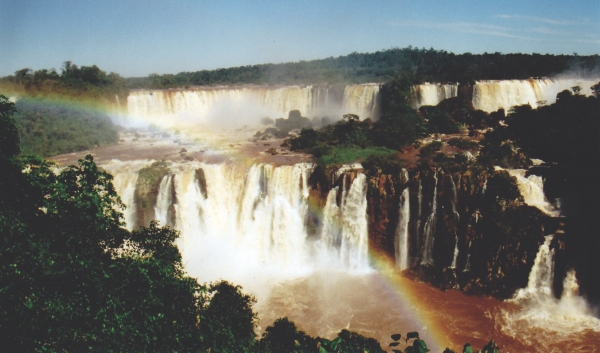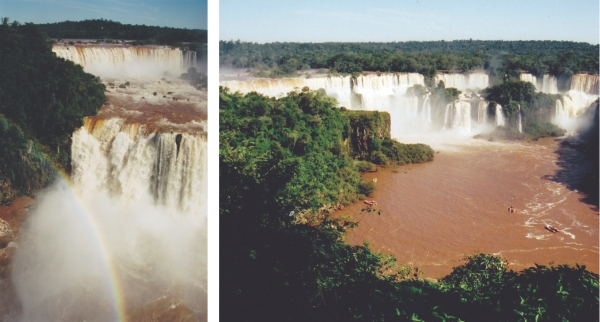| Home - Back Issues - The Team - Contact Us |
 |
| Volume 10 |Issue 40 | October 21, 2011 | |
|
|
Travel
Where the World is Flat Andrew Eagle From deep green jungle chocolate channels emerge, rush and swirl, vine-twisting like the weave and weft of events: places, events and faces. That channel there! It's when at 23, I found myself in an Iranian university lecture, barely decipherable biology in Farsi: tomatoes and potatoes, with burka clad women in rows on the left. Where it meets that small stream: that must be the lecturer who'd somehow been to Adelaide and thought to discuss cricket before moving on to legumes. There's the whole of the world and all of life to be found in that South American river. It had all my memories in it. The scenery is in tri-colour: green, brown and toasted orange sky; and the liquid patterns are absurd. That channel over there! That's the small town in Rajasthan where at 20, I was called into the school and drank tea with the teachers in the headmaster's office. They'd slurped loudly in tea-appreciation and I'd tried to replicate but burst out laughing at what in Australia was rude. We'd culture-shared and they'd laughed at my laughter. The water, thing of beauty and life-shapes, carries sticks, leaves, anything that comes to it. All is brought together, ultimately, in the unity of the vast liquid plain, in waiting for its purpose. I'd never imagined a waterfall could impress quite like that. I'd not seen Iguazu. 'It's relatively easy for westerners to let go and be free of their daily dramas,' Giulia had said, 'but so few do. Fear holds them back. Somehow they like their dramas; it gives comfort.' Guilia and Igor were the Europeans I'd ignored at the mission but had met in San Ignacio on the following day regardless, at the stretch of road that doubled as bus stop. They were in the final stages of a round-world journey and we were all headed to the falls. 'No, it's not genes,' Igor was saying at the bus stop, 'Tahitians are fat because France subsidises the price of baguettes. An English-style loaf costs ten times as much.' 'It's not just the baguettes,' Giulia replied. 'Two points, there's the paté: goose liver, full of fat and subsidised.' I soon discovered Igor had this curious habit of awarding points for what people said. Within minutes I'd raced ahead of Giulia, who'd only managed six to my ten, unless it was one of those games where the more points you earn the worse you're doing. Not knowing the rules my game plan had no strategy.
‘How did you like Australia?' I asked. 'Ten points, it was brilliant,' he said. 'There are few truly jaw-dropping moments in this world,' Giulia said, 'but Uluru and the Great Barrier Reef both made my jaw drop.' 'Another two points,' Igor said, 'Australians can fix anything, like that problem with our plane ticket.' 'New Zealanders were more interested in money,' he said. 'Two points again. It's because of the Americans who drop by New Zealand for two weeks and take helicopter rides to mountain tops. They're too obese to walk and it makes New Zealand expensive for everyone.' 'He hasn't been the same since they bombed Belgrade,' Giulia explained. As tall as Giulia was, Igor was taller, probably star basketball player for Serbia. That's why, when the bus finally arrived, ten points to the bus company, Igor hit his head on the roof while trying to sit, minus five. I'd graduated to awarding points of my own and it felt good. 'You think the rain might stop?' I said to Igor, 'five points.' He looked at me with suspicion but after some contemplation seemed to accept my efforts, perhaps because he'd always awarded points and never actually earned any. Water leaked through the bus roof as the scenery rattled by: rolling red dirt hills, small wooden farmhouses, scrawny chickens and hints of jungle, towards Argentina's end. It was the following morning we'd made it to the national park and the falls. Waterfalls are, in general, pleasant, but even if these were big and straddled the border with Brazil? It all changed when first we saw them. 'It's another jaw dropping moment for me,' Giulia said. There were hundreds of large falls including one directly beneath the platform where we stood, the smallest of which would be an important tourist site in most countries, but here just entrée to the colossal liquid horseshoe in the distance that blended jungle, spray and sky into the horizon hills of far Brazil. 'That's the Devil's Throat, it's two kilometres across,' Giulia said, 'let's go there last.' We wound our way around the lower section, with platforms perched close enough to be drenched in seconds just from the spray. A squirrel sat on the railing, jumping and flit-flitting its bushy tail. And there! In the tree, was our first wild toucan! 'Argentina has style,' Igor proclaimed in the direction of the squirrel, 'in Buenos Aires I saw a bidet in a public toilet.' 'You were impressed by that bidet weren't you?' said Giulia. 'It would never happen in Chile,' he retorted, 'all money, no class. They serve instant coffee in little packets and think that's European.' We encountered fuzzy-faced cai monkeys, a troop of 30 or more. The whole troop made this canopy leap, one by one, across a gap. In the early afternoon we walked on water, across aluminium bridges, as we island hopped the last kilometre to the top of the great Earth-yawn. The little river islands are stubborn, I saw, fixated with stasis and thinking they can avoid change; but they have to grab every passing soil grain upside to maintain that illusion. It takes energy to stand still. Perhaps fear holds them back. Middle Age European seers thought the world flat. It would've been understandable had not the Greeks many centuries earlier known it to be round: knowledge discovered and discarded, returned to jungle, moss and strangler fig. It would've been likewise understandable had they thought it while standing atop the Devil's Throat, where two kilometres of planet seem to disappear suddenly downwards into a mist-void. Modern science might be tempted to vote for flatness there. Maybe it's the deception of sunshine and spray, together creating permanent rainbows far below that lure like sirens the mass of water to the edge. Maybe it's because the unseeable rocks at the bottom hit and split that water so violently the whole place roars. I couldn't hear Giulia speak so I just nodded. But when the worst happens help always seems to arrive in some unusual way, like that Iranian girl travelling on the bus with her grandmother, who'd uninvited rechristened me Farid because she couldn't say my name and together we'd discovered and sung that Salam Ebdasam, Salam Farid song most of the way to Bandar Buhshehr. How had she known it was right on that day I'd needed frivolous distraction? Just when all seems lost the water at the base of the falls regroups, altered and revitalised, and sometimes by chance it's you who drop unexpected into someone's far away life with something to offer, an opportunity to be useful in some modest probably unknown way. Sometimes you're the Ebdasam, the water that pushes in a broad sweep down valley away from crisis. The river disappears in the direction of Paraguay, stronger and more together, to some final destination the indignant river islands will never see. Might it be the chaotic enchantment of Buenos Aires? Or the land of the delta? The names in this piece have been changed.
Copyright
(R) thedailystar.net 2011 |
||||

